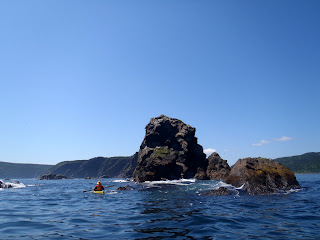3 days ago
Saturday, July 23, 2011
In search of Bjarni Herjolfsson
In the year 985 Norwegian Bjarni Herjolfsson sailed from Iceland to Greenland, following his father. Once out at sea a fierce northeast wind sprang up "for many days" and he was blown off course. When the wind dropped and the fog lifted they were able to sight land but it wasn't Greenland. Farley Mowat in his book "WestViking" presents a plausible argument it was the east coast of the Avalon Peninsula between Cape Race and Cape St. Francis.
Today, Dean, Gary and I paddled to Cape Spear to see if there was any sign of Bjarni through the wisps of time.
Incidently, my GPS started a second track (the black crumbs) after it lost satellite contact when I was in a cave.
We met at 10:00 in the quaint fishing village of Quidi Vidi. There was no wind as we made our way out of the protected harbour right on the doorstep of St. John's.
The conditions were pretty benign for St. John's Bay. Everything looking good (depending on your perspective, right Malcolm? *lol*) we paddled south towards the entrance to St. John's harbour and Freshwater Bay.
We checked for traffic entering or exiting the harbour before dashing across the Narrows but not before having a peek inside.
Across the Narrows, we paddled along by Fort Amherst. The gun emplacements that protected the harbour during WW II (the Big One) are still there but the guns have been removed.
We continued on past the Southside Hills to starboard until we reached the bottom of Freshwater Bay. A large barasway separates a freshwater lagoon from the ocean's salty water.
There were some opportunities to paddle through interesting passageways.
The easterly cliffs of Freshwater Bay were occupied by thousands of seagulls. As we approached they were circling around like a halo of flies, and just as thick.
Out of Freshwater Bay we continued to handrail along the coast.
We passed by Blackhead and approached Cape Spear from the west. Its a popular place for tourists and local residents alike as its the most easterly point on North America. We could see it was busy with the sun shining off of the windshields of cars parked.
Made it; the most easterly point of North America. Conditions picked up a bit as we paddled out past the Cape but nothing like it has been on previous occasions I've been out here.
Dean and I did a couple of rolls like trained seals for the sightseers lining the cliffs. We hope they enjoyed it but couldn't collect the money they no doubt threw our way.
The Cape is 7.5 kms from put-in at Quidi Vidi as the crow flies but handrailing bumped the distance up to 16 kms. We hung out a while at the Cape but never saw Bjarni. Maybe he had a beautiful sunny day after the storm to see this coast as we did today. In any case, time was moving on so we turned and headed back.
Subscribe to:
Post Comments (Atom)












No comments:
Post a Comment